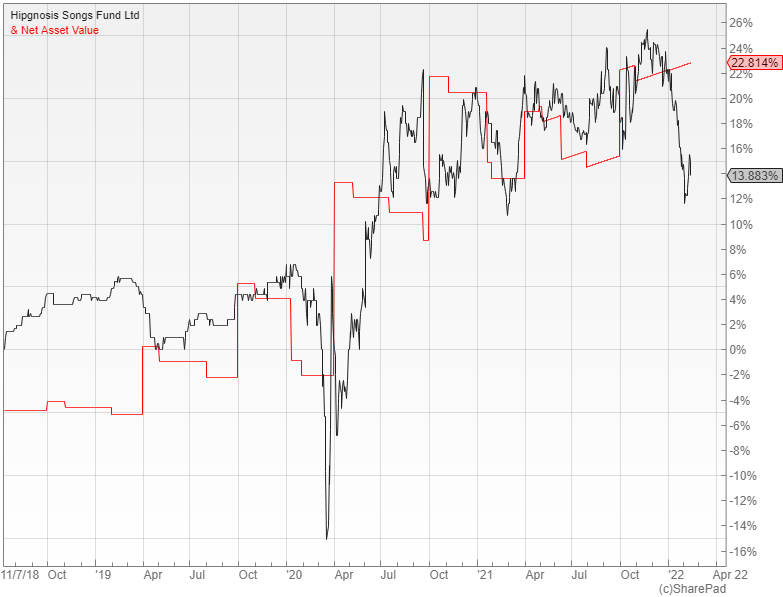Going for a song: has the write down at Hipgnosis Songs gone too far?

The decision by the singer Neil Young to remove his material from Spotify has sparked a sell-off at the music royalties trust Hipgnosis Songs, but it is possible that the weakness has created a buying opportunity.
On January 24, the world famous performer Neil Young asked for his tracks to be taken off the streaming service Spotify, due to his view that a recent podcast on the platform had spread misinformation about vaccines. His recordings were then removed from the service two days later.
The move prompted a sell-off at the £1.4bn music royalties trust Hipgnosis Songs (LSE: LON) that had acquired 50% of Young’s writer’s copyrights in January 2021 for $40m to $50m according to the Wall Street Journal. These copyrights relate to the song writing/publishing rather than the master recordings, which remain controlled by his record label, Warner Records.
Hipgnosis’ share price has hit a weak patch and is down around seven percent year-to-date. At 117p they are trading at a discount of about eight or nine percent to the NAV as estimated by the broker Investec, whereas in the past they have normally stayed close to the underlying value.
What is the likely impact?
Despite owning half of the rights, Hipgnosis does not have the authority to say which platforms the music can be streamed on. Assuming Young’s songs were valued at 20 times income when they were acquired, analysts at Stifel using an alternative reported purchase price of $150m have estimated they could have generated $7.5m, or just over six percent of the $121m of royalties the trust received in the year to 30 September 2021. There could also be wider repercussions if more artists follow suit.
Investec however have come up with a much more modest figure that is more in line with the view of house broker JPMorgan Cazenove. They calculate that if Neil Young earns $754,000 a year from Spotify as reported in Variety Magazine then SONG’s maximum share would be half of this, namely $377,000. This would only represent about 0.3% of net revenue for the full financial year, with the broker estimating that the catalogue of 590 songs represents about 2.5% of NAV.
Last year the trust’s founder, Merck Mercuriadis, said that Young’s arrival in the portfolio had changed it forever and even if the music stays off Spotify permanently, the management can always try to boost the number of the singer’s songs streamed on Apple, where they are still available. The evidence suggests that they might not have to try too hard as the publicity seems to have raised the aging rocker’s profile with younger listeners.
Spreading the word
Mercuriadis recently said that the streaming of Young’s songs had actually increased by 38% in the first week after the music had been taken off Spotify. The management also reported that physical album sales had increased threefold over the same period.
Hipgnosis updates its NAV twice a year at the end of March and September. It is a difficult area for outsiders to calculate, which explains why the analysts vary in their current estimates with Numis putting it at 118.6p, Winterflood 126.3p and Investec 127.9p. At time of writing the shares were trading at 117p, so whichever one you go along with makes a big difference to the level of the discount.
Investec like the fundamental attractions of the sector and believe that the recent share price weakness represents an attractive buying opportunity to access a diversified portfolio of music copyrights. The shares are currently paying a yield of 4.4% and offer a largely uncorrelated source of income with the prospect of long-term capital growth due to the increase in worldwide streaming.

Comments (0)